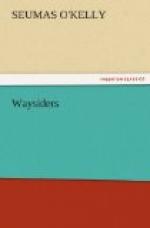“There should be a brisk demand now that the winter is upon us,” she said hopefully. “God be with you.”
“God and Mary be with you, mother,” Denis Donohoe made answer as he took the donkey by the head and led him along the dark road. The little animal drew his burden very slowly, the cart creaking and rocking noisily over the uneven road. Now and then Denis Donohoe spoke to him encouragingly, softly, his gaze at the same time going to the east, searching the blank sky for a hint of the dawn to come.
But they had gone rocking and swaying along the winding road for a long time before the day dawned. Denis Donohoe marked the spread of the light, the slow looming up of a range of hills, the sweep of brown patches of bog, then grey and green fields, broken by the glimmer of blue fakes, slopes of brown furze making for them a dull frame.
“Now that we have the blessed light we won’t feel the journey at all,” Denis Donohoe said to the donkey.
The ass drew the creel of turf more briskly, shook his winkers and swished his tail. When they struck very sharp hills Denis Donohoe got to the back of the cart, put his hands to the shafts, and, lowering his head, helped to push up the load, the muscles springing taut at the back of his thick limbs as he pressed hard against the bright frosty ground.
As they came down from the hills he already felt very hungry, his fingers tenderly fondling the slices of oaten bread he had put away in the pocket of his grey homespun coat. But he checked the impulse to eat, the long jaw of his swarthy face set, his strong teeth tight together awaiting the right hour to play their eager part. If he ate all the oaten bread now—splendid, dry, hard stuff, made of oat meal and water, baked on a gridiron—it would leave too long a fast afterwards. Denis Donohoe had been brought up to practise caution in these matters, to subject his stomach to a rigorous discipline, for life on the verge of a bog is an exacting business. Instead of obeying the impulse to eat Denis Donohoe blew warm breaths into his purple hands, beat his arms about his body to deaden the bitter cold, whistled, took some steps of an odd dance along the road, and went on talking to the donkey as if he were making pleasant conversation to a companion. The only sign of life to be seen on earth or air was a thin line of wild duck high up in the sky, one group making wide circles over a vivid mountain lake.
Half way on his journey to the country town Denis Donohoe pulled up his little establishment. It was outside a lonely cottage exactly like his own home. There was the same brown thatch on the roof, a garland of verdant wild creepers drooping from a spot at the gable, the same two small windows without any sashes in the front wall, the same narrow rutty pathway from the road, the same sort of yellow hen cackling heatedly, her legs quivering as she clutched the drab half door, the same scent of decayed cabbage leaves in the air. Denis Donohoe took a sack of hay from the top of the creel of turf, and spread some of it on the side of the road for the donkey. While he did so a woman who wore a white cap, a grey bodice, a thick woollen red petticoat, under which her bare lean legs showed, came to the door, waving the yellow hen off her perch.




